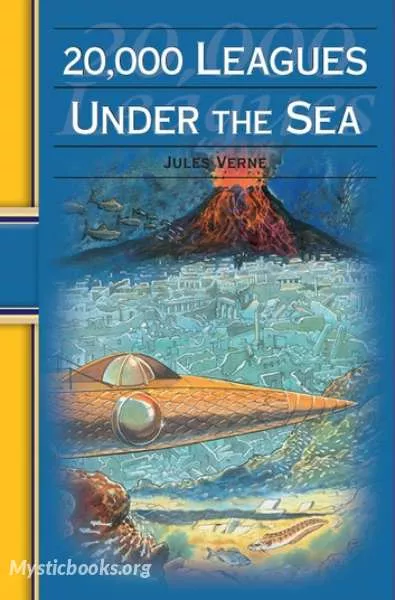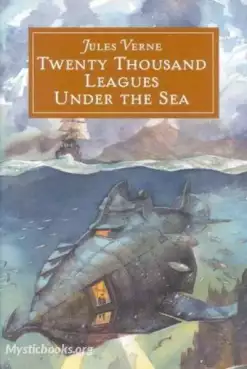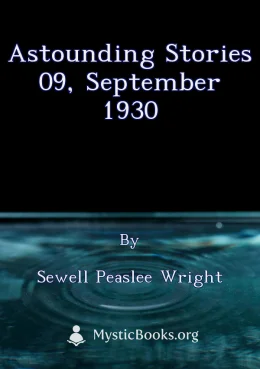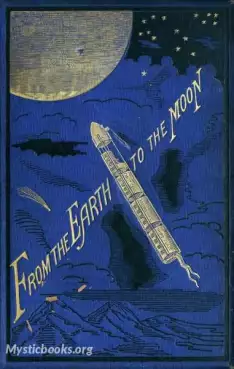
Zwanzigtausend Meilen unter'm Meer
by Jules Verne
'Zwanzigtausend Meilen unter'm Meer' Summary
The novel is supposedly an experience report of the French professor Pierre Aronnax, author of a work on "The secrets of the sea depths". In the years 1866 and 1867, mysterious ship accidents accumulated on all the world's oceans. The press speculates that a hitherto unknown sea monster or an "underwater vehicle with extraordinary mechanical power" capsized the ships. Aronnax suspects a gigantic narwhal as the cause. Because of his expertise as a marine scientist, the American government asked him in 1867 to join an expedition to clarify the matter. Aronnax, accompanied by his indifferent servant Conseil, sets sail on board the US frigate Abraham Lincoln.
After weeks of searching in the North Pacific, they spot the object in question. In the course of the subsequent chase, Aronnax, Conseil and the Canadian harpooner Ned Land are washed into the open sea, but ultimately find solid ground under their feet on the surface of the supposed sea monster. It turns out that it is actually an iron-built submarine. After a while, a hatch opens, from which crew members of the vehicle step out and lock the three men in a cell. Later they are shown to the captain, who introduces himself as “Nemo” - Latin for “nobody”.
Over time, in conversations with the mysterious Nemo, Aronnax learns details about the technical capabilities of the submarine, the Nautilus, but hardly anything about her captain and crew. Nemo not only broke with humanity, but also with the earth and provides for himself and his team exclusively from the treasures of the sea. So he exploits underwater coal seams to meet the fuel needs of his electricity-powered ship, and the crew's provisions are made up exclusively of marine animals and plants. Nemo reveals little about his background - only in the second volume of the novel ( The mysterious island) he indicates his tragic fate: Fatherland, wife and children were taken from him by earthly powers, and so he turned his back on the world to sail the oceans as an avenger of the disenfranchised. Since no one is allowed to find out his secret, the release of the three castaways is out of the question, and so they are forced to go on an underwater world trip on board the Nautilus.
They experience all kinds of adventures: They meet an Indian pearl diver, they recover the treasures of sunken Spanish galleons , take part in a funeral in an underwater cemetery, hunt a dugong , drive through an undersea tunnel from the Red Sea into the Mediterranean Sea , experience a volcanic eruption on the seabed near the island of Santorini , fighting against a giant octopus and a shark seen in the Atlantic the ruins of the sunken Atlantis and are on board as captain Nemo and his Nautilus the first man to the South Polereached - at that time it was not yet known that the south pole of the earth is located on the land mass of the continent of Antarctica . During the voyage, they get into dangerous situations several times, from which they are rescued by the Nautilus. Jules Verne describes the victory of technology over nature - technology makes everything possible. However, in the narrated biography of Nemos and the plot and dialogues, he repeatedly implicitly points out the danger that technology without responsibility harbours.
Professor Aronnax gets into an inner conflict on the journey. On the one hand, as a scientist, he would like to stay on board the Nautilus for as long as possible and explore marine life together with Captain Nemo; on the other hand, Ned Land asked him to flee from the ship. Ned Land's aversion to Captain Nemo, which is not overcome by the fact that they save each other's lives in the course of the voyage, leads to the professor temporarily "sitting between the chairs". This conflict is only resolved in the penultimate chapter of the second volume, when the professor and his companions witness how Captain Nemo sinks a ship in cold blood.
After this incident, however, Nemo is obviously unsettled by feelings of guilt and self-doubt, and his team also appears to be weakened or inattentive. The three prisoners manage a daring escape to the saving coast of Norway when the Nautilus gets caught in the vortex of the maelstrom.
Book Details
Language
EnglishOriginal Language
FrenchPublished In
1870Authors

Jules Verne
France
Verne is considered to be an important author in France and most of Europe, where he has had a wide influence on the literary avant-garde and on surrealism. His reputation was markedly different in an...
Books by Jules VerneDownload eBooks
Listen/Download Audiobook
- Select Speed
Related books

Twenty Thousand Leagues Under the Sea by Jules Verne
An early science fiction novel written by the second most translated author, French writer Jules Verne, the classic tale depicts an incredible sea exp...

Plague Ship by Andre Norton
Plague Ship is a science fiction novel by Andre Norton under the pseudonym Andrew North. It was published in 1956 by Gnome Press in an edition of 5,00...

Before Adam by Jack London
Before Adam is a novel by Jack London, serialized in 1906 and 1907 in Everybody's Magazine. It is the story of a man who dreams he lives the life of a...

Frigid Fracas by Mack Reynolds
It takes readers on a thrilling interstellar adventure set in the chilling expanse of Jupiter's moon, Europa. As humanity ventures deeper into the cos...

The Golden Slave by Poul William Anderson
Originally published in 1960, this timeless science fiction classic continues to captivate readers with its blend of adventure, romance, and thought-p...

Astounding Stories 09, September 1930 by Sewell Peaslee Wright
Astounding Stories 09, September 1930 is a collection of short science fiction stories from the golden age of the genre, circa 1930. Featuring tales o...

Fixed Flight by Maurice Renard
Maurice Renard's 'Fixed Flight' is a captivating tale of aerial adventure that explores the thrilling possibilities of flight. While drawing inspirati...

Plattner Story and Others by H. G. Wells
'Plattner Story and Others' is a collection of short science fiction stories by H.G. Wells, a pioneer of the genre. These tales explore themes of scie...

From the Earth to the Moon by Jules Verne
One of the earliest examples of literature written in the science fiction genre, From the Earth to the Moon is a part of the Voyages Extraordinaires s...

Destiny Times Three by Fritz Leiber
In a breathtaking leap through the corridors of time, Fritz Leiber's "Destiny Times Three" unfolds a riveting saga that defies the limits of the prese...
Reviews for Zwanzigtausend Meilen unter'm Meer
No reviews posted or approved, yet...